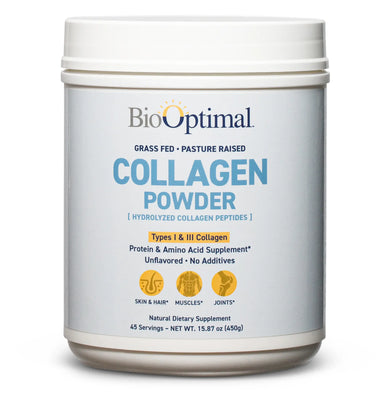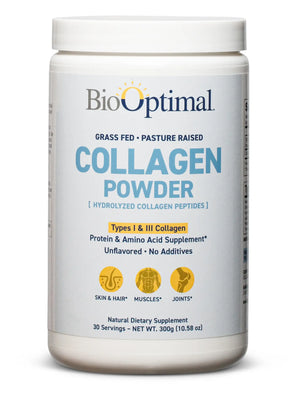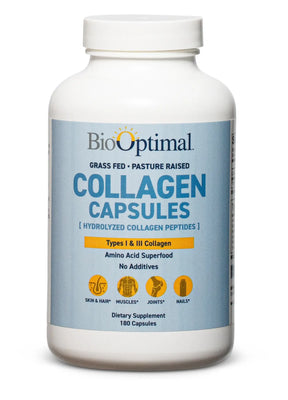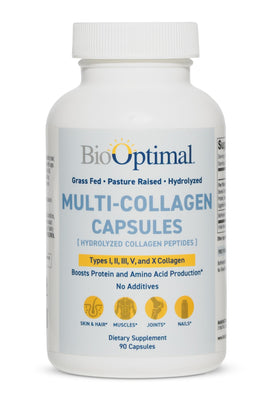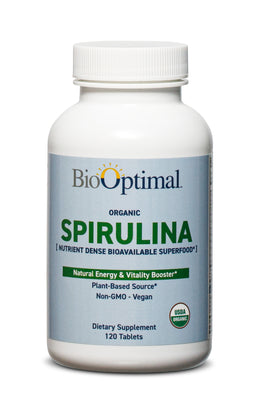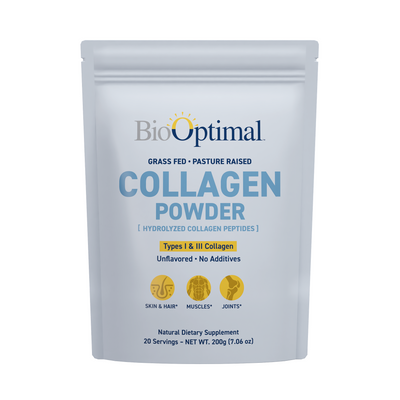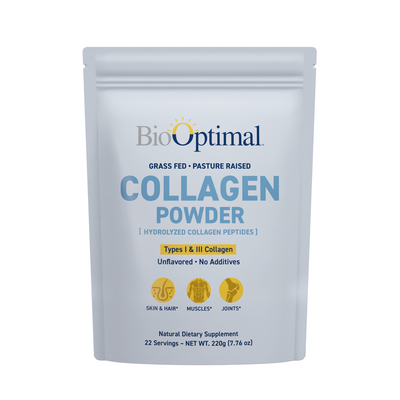Louis's takeaways:
Collagen peptides do not typically cause constipation, but some people may notice mild digestive changes, especially when starting the supplement. This reaction is often linked to factors like low water intake, sudden increases in protein, or pre-existing digestive sensitivity. Hydrolyzed collagen side effects are usually minimal, and constipation is considered uncommon. Most people tolerate collagen well and experience no changes in bowel habits. If you notice constipation, increasing hydration, adding fiber to your diet, and adjusting your serving size can help. Get in touch with a healthcare professional for personalized guidance.
Table of Contents:
If you’re adding collagen to your daily routine, you might wonder, does collagen peptides cause constipation? Collagen supplements are popular for supporting skin, joints, hair, and nails, but some people report digestive changes after starting them. While collagen is generally well-tolerated, it’s important to know possible reactions, including collagen constipation. This side effect is not common, but it can happen. It entirely depends on your digestion, hydration, and diet.
Most collagen on the market is hydrolyzed, broken down into tinier peptides for easier absorption. Like any protein supplement, collagen can occasionally affect bowel movements, especially if you increase your intake suddenly or aren’t drinking enough water. In this article, we’ll look at why constipation may occur, review potential hydrolyzed collagen side effects, and share tips to help prevent digestive discomfort so you get the benefits of collagen sans any unwanted issues.
What Are Collagen Peptides?
Collagen peptides, also known as hydrolyzed collagen, are proteins that are divided into smaller chains of amino acids for easier digestion and absorption. They are typically sourced from bovine (cow), marine (fish), or porcine (pig) collagen. People take collagen to support skin elasticity, joint comfort, hair strength, and nail health. Unlike fiber-rich foods, collagen contains no fiber, so collagen fiber intake is not a factor in its benefits. This is why collagen and hydration play a bigger role in avoiding digestive issues.
While most products are pure protein, some may contain collagen supplement additives, which can occasionally affect digestion. Choosing a high-quality supplement and staying hydrated helps you get the most out of collagen. Many users report positive results, and proper use of collagen is unlikely to disrupt digestion. Understanding how it works can help prevent constipation and collagen concerns before they start.
Understanding Constipation
Constipation occurs when bowel movements are infrequent or difficult to pass, often leaving you feeling bloated or uncomfortable. It’s more common than many realize. Approximately 16% of U.S. adults experience constipation, as per NIDDK. The prevalence increases with age, with 33% of adults over 60 reporting constipation. Causes range from low-fiber diets and inadequate water intake to certain medications and reduced physical activity.
In the context of supplements, low collagen fiber intake means users must pay more attention to collagen and hydration to avoid sluggish digestion. Some collagen supplement additives could also play a role in digestive changes. Thankfully, simple adjustments like increasing fiber, drinking more fluids, and gradually introducing collagen can prevent constipation and collagen issues. Knowing the risk factors can help you keep your digestion comfortable while enjoying the benefits of collagen.
Can Collagen Peptides Cause Constipation?
While collagen is generally well tolerated, some people may experience mild digestive changes, including constipation. Understanding the collagen peptides' definition—pure protein with no fiber—helps explain why bowel habits could shift if other dietary factors aren’t balanced. Constipation from collagen is usually linked to indirect factors such as hydration, fiber intake, or supplement quality. Recognizing these influences can help reduce collagen's adverse effects and keep digestion smooth while enjoying the benefits.
Lack of Fiber Intake
Collagen contains protein but no fiber, so adding it to your diet without increasing fiber can slow intestinal transit. This is especially important for replacing a fiber-rich snack or meal with collagen. Low collagen fiber intake can make stools more challenging to pass. Pairing collagen with fruits, vegetables, or whole grains can help offset this and prevent constipation, a possible adverse effect of collagen.
Dehydration and Protein Digestion
Water is key in breaking down and moving protein through the digestive tract. Without enough fluids, collagen digestion can slow, leading to constipation. The definition of collagen peptides means they are protein-dense, so the body needs extra hydration to process them efficiently. Drinking sufficient water all day helps with digestion, minimizes the adverse effects of collagen, and helps maintain healthy bowel movements when adding collagen to your routine.
Fillers, Additives & Sweeteners
Some low-quality collagen supplements contain fillers, artificial sweeteners, or flavorings that can irritate the gut. These collagen supplement additives may cause bloating, discomfort, or contribute to constipation in sensitive individuals. While pure collagen rarely causes significant issues, additives can change the digestive response. Reading labels carefully and choosing a clean product reduces the risk of adverse effects of collagen and ensures that unnecessary ingredients don’t cause digestive changes.
Dosage and Rate of Increase
Taking large amounts of collagen can suddenly overwhelm the digestive system, especially if your body isn’t used to concentrated protein supplements. Start with tiny doses and gradually increase the amount, giving your gut time to adapt. This step-by-step approach reduces the likelihood of constipation, an adverse effect of collagen. It also gives you time to monitor your body’s reaction and adjust before significantly increasing your intake.
Individual Sensitivity
The digestive response to collagen varies from person to person. Some individuals may experience constipation or bloating, while others notice no changes. Factors like hydration, diet, activity level, and gut health all affect how your body reacts. While the definition of collagen peptides is straightforward, personal tolerance is not. Tracking symptoms and making minor dietary adjustments can help prevent adverse effects of collagen in those with sensitive digestion.
What Does the Science Say?
Research on collagen and digestion is limited, but existing studies and user surveys provide helpful clues. While collagen is considered safe and well-tolerated, digestive changes can occur for some people. Understanding real-world user experiences and clinical observations can help answer the question: Do collagen peptides cause constipation? The evidence suggests constipation is more likely due to dietary habits, hydration, and product formulation than collagen.
Consumer Survey Data
Supplement industry surveys show that collagen is widely used—about 29% of adults report taking it regularly. According to national statistics, 16% of the general population experience constipation. While this does not prove that collagen causes constipation, it highlights that digestive issues are common and may overlap with supplement use. When people ask whether collagen peptides cause constipation, survey results suggest that any link is likely indirectly tied to hydration, fiber intake, and individual digestive health rather than collagen alone.
Clinical Observations
From a clinical perspective, there is no substantial evidence that collagen directly causes constipation. Most studies on collagen focus on skin, joint, and bone health, not digestive side effects. However, clinicians note that adding protein without balancing fiber and fluids can slow bowel transit. This means that, while collagen peptides cause constipation, it is not supported by a direct scientific link- maintaining proper hydration and dietary fiber remains essential for digestive comfort when adding collagen to your diet.
Common and Rare Side Effects of Collagen Peptides
While collagen is generally safe for most people, it can cause mild digestive or other side effects in some instances. Many users tolerate collagen well, but understanding common and rare adverse effects of collagen helps you make informed choices. Most reactions are temporary and improve with dosage adjustments, hydration, or dietary balance. Rare side effects are typically linked to allergies, underlying health conditions, or excessive intake.
Stomach Fullness, Bloating, Gas
Some people experience a sensation of fullness, mild bloating, or increased gas when starting collagen peptides. This is often due to the sudden addition of concentrated protein to the diet. Gradually increasing your intake and drinking more water can reduce these digestive changes.
Lingering Taste
Collagen peptides are generally flavorless, but some users report a faint aftertaste—especially with marine-sourced collagen. Mixing collagen into smoothies, coffee, or flavored beverages can mask any lingering taste without affecting its benefits.
Skin Reactions, Blood Pressure Changes, Allergies, Kidney Stones, Hypercalcemia
Rarely, collagen may trigger skin rashes or allergic reactions, especially in those sensitive to bovine, marine, or porcine sources. Some animal-derived collagen may influence calcium levels, potentially leading to excessive hypercalcemia. People with a history of kidney stones should carefully monitor protein and calcium intake. Limited reports suggest collagen may affect blood pressure in sensitive individuals. Always consult a healthcare provider if you have underlying conditions or experience unusual symptoms.
How to Prevent Constipation When Taking Collagen?
Collagen-related constipation is uncommon, but small changes in your routine can reduce the risk even further. These tips balance hydration, diet, and supplement quality for comfortable digestion.

Hydration Strategies
Adequate water intake is essential for processing protein and keeping stools soft. Aim for at least eight cups daily, and drink a full glass of water with your collagen serving. Pairing collagen and hydration supports smooth digestion and helps prevent constipation, especially if your overall fluid intake is low.
Boosting Dietary Fiber
Since collagen contains no fiber, add fiber-rich foods such as fruits, vegetables, legumes, and whole grains to your meals. A higher collagen fiber intake balance helps with daily bowel movements and reduces the risk of constipation. For added digestive support, consider soluble fiber sources such as oats or chia seeds.
Starting with a Low Dose
Begin with a smaller collagen serving and increase gradually over one to two weeks. This allows your gut to adapt and minimizes digestive discomfort. A slow introduction is invaluable for sensitive individuals or those new to protein supplements, lowering the risk of collagen adverse effects like constipation.
Choosing Pure, Third-Party Tested Products
Select collagen supplements without unnecessary fillers, artificial sweeteners, or excessive collagen supplement additives. Third-party testing ensures purity and safety, reducing the likelihood of unwanted digestive changes. Clean, high-quality collagen is less likely to cause adverse reactions.
Switching Collagen Sources
If you notice persistent digestive discomfort, try changing the collagen source—bovine, marine, or porcine. Some people tolerate one type better than others. Switching sources can eliminate mild collagen adverse effects without giving up the supplement entirely.
Taking with Vitamin C
Vitamin C supports collagen synthesis and may improve absorption. Pairing collagen with a source of vitamin C, such as citrus or berries, won’t directly affect constipation risk but can maximize overall benefits. This makes your supplement routine more effective while maintaining digestive comfort.
When to Consult a Healthcare Provider?
While most people tolerate collagen well, certain situations call for professional guidance. You should get in touch with a healthcare provider if constipation lasts more than a week despite increasing hydration and fiber, or if it’s accompanied by extreme abdominal pain, blood in the stool, or unexplained weight loss. These symptoms may indicate an underlying condition unrelated to collagen. People with kidney disease, high calcium levels, or a history of kidney stones should discuss collagen use with their doctor before starting, as excessive protein or calcium intake may worsen these conditions. Those with allergies to bovine, marine, or porcine sources should also seek advice to avoid reactions. Pregnant or breastfeeding women, older adults, and individuals taking prescription medications should get clearance before adding collagen to their diet. When in doubt, professional guidance ensures you avoid potential adverse effects of collagen while safely enjoying the supplement’s benefits for skin, joints, and overall health.
Frequently Asked Questions
1. Can collagen make you constipated?
Collagen rarely causes constipation directly. Digestive issues usually result from low fiber intake, inadequate hydration, specific fillers, or starting too quickly with a high dose. Balancing water and fiber, along with a gradual dosage, can help maintain regular bowel movements while taking collagen supplements.
2. Is there a downside to taking collagen peptides?
Possible downsides include mild digestive discomfort, lingering aftertaste, allergenic reactions in sensitive individuals, potential heavy-metal contamination from poor-quality products, and the ongoing cost. Choosing pure, third-party tested collagen and monitoring your body’s response minimizes risks while maximizing the supplement’s benefits for skin, joints, and overall wellness.
3. Is collagen hard on your digestive system?
Hydrolyzed collagen is usually easy to digest and may even support gut health by providing amino acids like glycine. However, some people experience temporary side effects such as bloating or constipation, typically linked to hydration, fiber balance, or dosage changes rather than collagen.
4. What do you avoid when taking collagen?
Avoid collagen products containing unnecessary fillers, artificial sweeteners, or additives. Don’t neglect proper hydration and fiber intake- both are essential for digestion. Also, avoid high-sugar diets, excessive alcohol, smoking, and prolonged unprotected sun exposure, which can degrade your body’s natural collagen and counteract supplement benefits.


